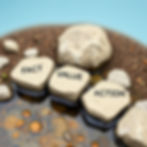Why This Library Exists
This library was built to make DBT simple skills, accessible, and real.
You don’t need to be in therapy to start learning — these skills are teachable, repeatable, and designed for practice in real life.
Each tool here supports one of DBT’s four foundations:
-
Mindfulness: noticing without judgment
-
Distress Tolerance: surviving the moment without making it worse
-
Emotion Regulation: acting from values, not urges
-
Interpersonal Effectiveness: communicating clearly while maintaining self-respect
Regular skills practice — even 5 minutes a day — can reduce emotional crises and increase calm, connection, and control.
You don’t have to do this perfectly; small reps matter most.
How to Use This Library
This page is your skills map.
If you’re not sure where to start, follow this path:
-
Feeling scattered or shut down? → Start with Mindfulness & Grounding
-
Feeling like everything’s too much? → Go to Distress Tolerance
-
Feeling big emotions you can’t name? → Try Emotion Regulation
-
Struggling in relationships or boundaries? → Read Interpersonal Effective


Each page includes:
-
A short, trauma-aware summary
-
A micro-practice (1–2 minutes)
-
Downloadable flashcards or worksheets
-
Links to Elara AI for practice and feedback
Featured Resources

A 30-day journey through real-world DBT application — written in peer-friendly language.
Build habits that regulate emotions, strengthen communication, and improve daily structure.
✅ Printable or fillable PDF
✅ ADHD-friendly pacing (15 mins/day)
✅ Trauma-informed layout and prompts
Explore the Core Skill Areas
Each skill hub below opens into a structured guide, complete with printable worksheets and links to deeper modules.
60-Second Tiny Wins
If you’re in overload, you don’t need to read — you just need one small action.
Try one of these:
Mindfulness
Name 3 things you can see, 2 you can hear, 1 you can touch.
Distress Tolerance
Splash cool water on your face for 30 seconds, then breathe 4-in / 6-out five times.
Emotion Regulation
Write one sentence: Right now I feel ___, and it makes sense because ___.
Interpersonal
Practise a “polite no” — “I can’t today, but thank you for thinking of me.”
That’s one rep. One rep builds awareness; awareness builds change.
Download Zone
Printable Flashcard Deck (PDF + PNG)
DBT 30-Day Workbook (Free Sample)
Behavioural Activation & Low-Mood Action Plan
Turn shutdown and low motivation into tiny, structured actions across pleasure, mastery, connection, and values, with daily check-ins and safety notes.
Shame, Self-Criticism & Self-Compassion Mini-Workbook
Distinguish shame from guilt, map shame triggers, and practise self-compassion scripts informed by Neff, Gilbert, and Brené Brown’s shame resilience work.
Boundaries in Real Life Plan
Clarify your limits, write boundary scripts using DEAR MAN / GIVE / FAST, and debrief boundary attempts without collapsing into guilt or self-blame.
Behaviour Analysis / Chain Analysis Worksheet
Unpack “how did I end up here again?” by mapping vulnerability factors, prompting events, links in the chain, consequences, and alternative skills.
Emotion Naming & Body Map Workbook
Identify emotions, link them to body sensations, and practise putting feelings into words so they’re easier to manage and talk about.
Behaviour Analysis / Chain Analysis Worksheet
Values & Life Directions Map
Emotion Naming & Body Map Workbook
Values & Life Directions Map
Accessibility & Trauma Awareness
Every resource in this library follows trauma-informed design principles:
-
Neutral, non-triggering colour palettes
-
Plain language explanations
-
Body-based alternatives to cognitive exercises
-
Encouragement to pause and self-regulate before deep work
If something feels overwhelming, you can always return later — progress isn’t linear, and that’s okay.
Library FAQs
No. This is self-guided psychoeducation and peer learning. For clinical therapy or crisis needs, use the crisis links below.
Go to Distress Tolerance → Crisis Survival. It’s designed for exactly those moments. If you feel unsafe, contact 000 or Lifeline 13 11 14 (Australia).
Yes — all worksheets, flashcards, and guides are printable or available as fillable PDFs.
Yes. DBT skills improve impulse control, focus, and emotion regulation — areas that overlap with ADHD challenges. Each tool here includes quick, body-based options and sensory-friendly formats.


Safety & credits
Scope: Psychoeducation and peer support only — not therapy, diagnosis, or a crisis service.
If you’re in crisis (Australia): 000 • Lifeline 13 11 14 • Suicide Call Back 1300 659 467 • Beyond Blue 1300 22 4636 • 13YARN 13 92 76 • Kids Helpline 1800 55 1800 • 1800 RESPECT 1800 737 732
Global: findahelpline.com
Author: Lloyd Taylor | DBT-informed Peer Recovery Worker and Founder, DBT Support Hub
Last updated: October 2025
References:
Linehan, M. M. (2015). DBT Skills Training Manual (2nd ed.). Guilford.
Rizvi, S. L., Steffel, L. M., & Carson-Wong, A. (2013). An overview of DBT for high-risk behaviours. Harvard Review of Psychiatry, 21(4), 201–215.


